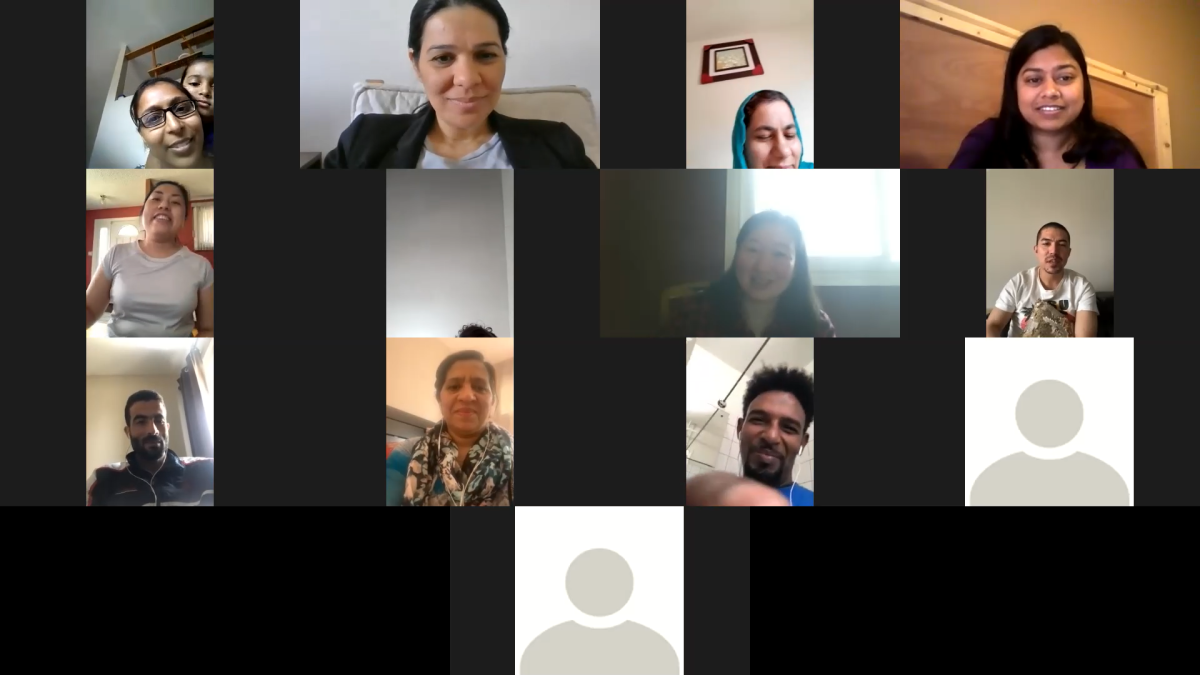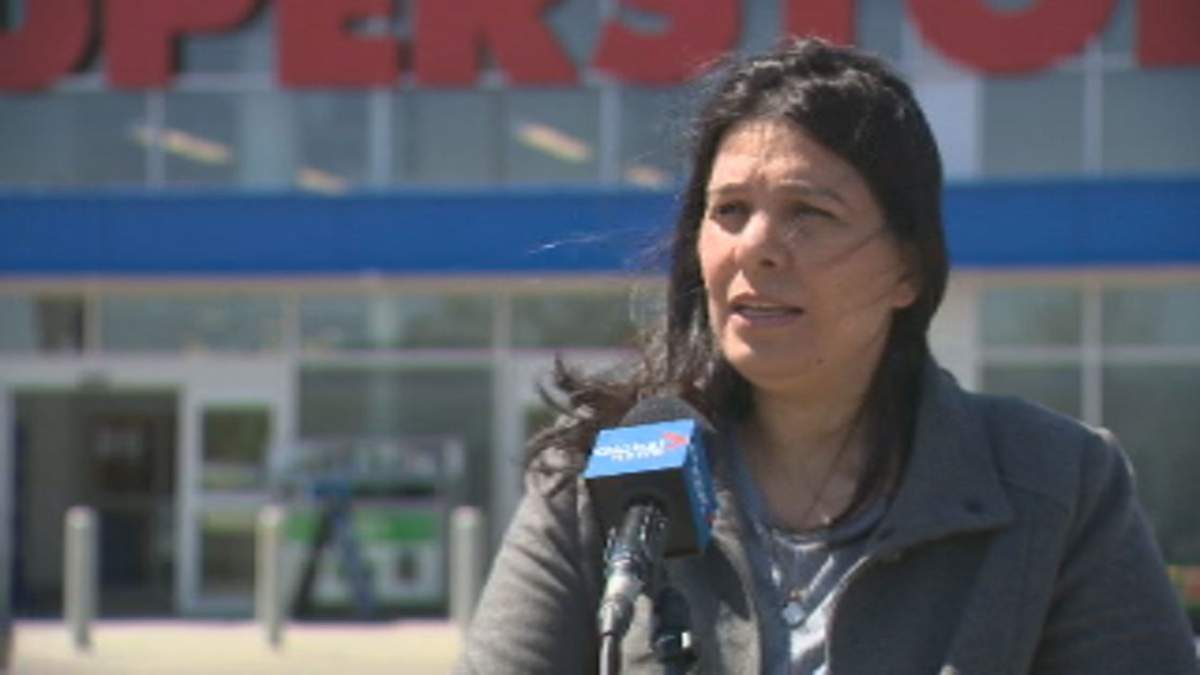As Saskatchewan reported its first case of the novel coronavirus — followed by a second and a third — Daniel Hailemrim watched the news closely, trying to figure out how he would be impacted as an employee of one of Regina’s busiest grocery stores.

“I remember, when it started, COVID-19 … food was empty,” says Hailemrim, 38, recalling the panic-buying residents did back in March at the Golden Mile Real Canadian Superstore, where he’s grateful for his job in the produce section. Hailemrim and his wife arrived in Regina in January 2019 from Eritrea.
Tigrinya is his first language but he’s learning more English every day with the help of a local organization.
Figuring out how to stay safe at work in a new country where you don’t know the language has been challenging, says Hailemrim, who is supporting a wife and baby at home.
It’s a situation that Rachel Chlaihawi, a language instructor at the Regina Open Door Society, a not-for-profit agency that works with government to help newcomers adjust, says many of her students find themselves in.
“I was feeling a big responsibility,” Chlaihawi says.
“Most of our students, because of their lower language proficiency, are not able to understand all of the news and (are) not able to understand all of the health orders.”
Although her 14 students have not been able to meet with her in the classroom for the past two months, she has been consulting with them daily over Zoom.
While they’ve reached the point where they can review the latest local and national COVID-19 updates and protocols, the first step was introducing them to previously obscure terminology that has become commonplace during the pandemic.
Here one year
In his home country of Eritrea, Hailemrim worked as an auto body technician and in construction. But in Regina, he struggled to communicate and quickly started English classes at the Open Door Society. Within a few months, he had improved his proficiency to the point that he was confident enough to seek employment.
Interactions at the Superstore over the past year have helped Hailemrim further break down language barriers, he says. While stocking fresh fruit and vegetables during his shifts, he has become used to questions and requests.
“All Regina is English,” he says. “I speak English. I listen English.

Get breaking National news
“I can help a customer when he needs something.”
Times change
Just as Hailemrim was starting to get the hang of things, the pandemic hit.
Less than a year into his job, the processes he worked so hard to learn drastically changed to safeguard against the threat of the coronavirus.
With some of Hailemrim’s colleagues no longer coming in for their shifts and the demand for groceries increasing, he — in need of the income and becoming acutely aware of the dangers of a food crisis — began working longer days.
He was wearing gloves more than usual as well a mask. He began to hear the term social distancing almost daily.
“It’s very difficult, very difficult,” he says.” Our Superstore is very busy.”
There has only been one case of the coronavirus reported in a Regina grocery store employee — at Golden Mile Superstore in early April. The location shut down temporarily for a deep cleaning.
Although Hailemrim doesn’t know the co-worker who got sick, it was scary to know the virus was so close, he says.
Golden Mile Superstore manager Keith Knoblauch said in an email statement that he is impressed by how employees, like Hailemrim, are handling the situation and “how committed they are to providing this essential service our local community.
“Nerves are definitely high, but as many of us live in the area, we know that by us coming to work each and everyday we’re helping to keep our neighbours healthy and fed.”
In recent months, Golden Mile Superstore has modified operations significantly “to keep our customers and colleagues safe,” Knoblauch said in the statement. Customer limits have been implemented. In areas, floors have been marked for physical distancing. Plexiglass shields have been installed. Employees are being provided with masks and gloves.
The power of words
Hailemrim says his managers and supervisors provided daily updates, even before there was a coronavirus case linked to the store.
He brought back some of what he learned about health and safety to his classmates, Chlaihawi says, and was able to share it with them in a way that was relevant.
“A lot of students were asking him about shopping because they were very intimidated,” Chlaihawi says.
“He was kind of sharing this experience with them, letting them know that a lot of people are coming shopping, but people are trying to keep their social distance.”
For her part, Chalihawi repeatedly reviewed the usually little-used terminology coming fast at her students: pandemic, outbreak, public health order, gathering, mandatory, prohibit and sanitize.
She tried to explain what social distancing means by creating a video of herself walking outside to show her class how much space they needed to maintain.
“Usually we would be teaching other skills, but I think life skills are one of the most important things,” she says.
When Hailemrim’s shifts clashed with his studies, he made the effort to keep up with both because he knew he could end up struggling with his rapidly changing work environment — potentially compromising the safety of himself and his family and the community.

Having Chlaihawi break down new and confusing terminology was helpful, Hailemrim says.
“She talks about COVID-19 every moment,” Hailemrim says. “She protects… us.”
Hailemrim’s story highlights the importance of making sure people with barriers to understanding public health orders during this pandemic get the assistance they need to keep themselves and their loved ones safe, Chlaihawi says.
“Bridging that information is very important,” she says, adding if people are slipping through the cracks, they could be putting the broader public at risk.
Questions about COVID-19? Here are some things you need to know:
Symptoms can include fever, cough and difficulty breathing — very similar to a cold or flu. Some people can develop a more severe illness. People most at risk of this include older adults and people with severe chronic medical conditions like heart, lung or kidney disease. If you develop symptoms, contact public health authorities.
To prevent the virus from spreading, experts recommend frequent handwashing and coughing into your sleeve. They also recommend minimizing contact with others, staying home as much as possible and maintaining a distance of two metres from other people if you go out. In situations where you can’t keep a safe distance from others, public health officials recommend the use of a non-medical face mask or covering to prevent spreading the respiratory droplets that can carry the virus.
For full COVID-19 coverage from Global News, click here.












Comments
Want to discuss? Please read our Commenting Policy first.